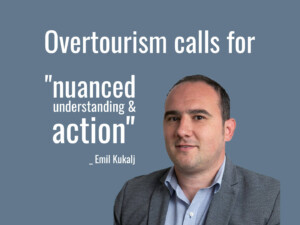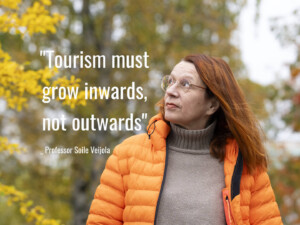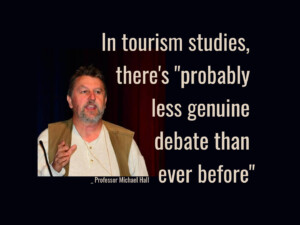Prof Dimitrios Buhalis on ‘overtourism’ and the ‘democratisation of tourism’
![Prof Dimitrios Buhalis on 'overtourism' and the 'democratisation of tourism' 1 Professor Dimitrios Buhalis on the ‘democratisation of tourism’ vs ‘overtourism’ ... “[T]here is no such thing as overtourism!”](https://www.goodtourismblog.com/wp-content/uploads/2024/02/Professor-Dimitrios-Buhalis-1024x768.jpg)
There’s always a tension between rights and responsibilities; the promise of freedom for oneself and the potential to infringe upon others.
This is playing out in debates about travel & tourism, and about what ‘progress’ looks like.
For Dimitrios Buhalis, pragmatic problem-solving is key to achieving win-win outcomes … for the billions who won’t be denied their dreams.
Saverio F Bertolucci interviewed Prof Buhalis for a Tourism’s Horizon Interview. For this “Good Tourism” Insight, Jim Butcher reflects. [The full transcript is on Substack.]
Contents
Who is Professor Dimitrios Buhalis?
Professor Dimitrios Buhalis is one of the best known and respected experts on global tourism. A long standing professor at Bournemouth University in the UK, he is a strategic management and marketing expert specialising in information and communication technology applications in the tourism, travel, hospitality, and leisure industries. He has written and co-edited more than 25 books and 300 scientific articles.
The ‘democratisation of tourism’
Dimitrios Buhalis is a fan of the democratisation of tourism. This is a term that seems to have become less popular today compared to a few decades ago, when it was generally taken as meaning the progress involved in more people being able to travel for leisure.
The progress narrative seems to have been somewhat overtaken by a sense that tourism, and society in general, is pushing against, or has surpassed, natural and cultural limits.
That latter view is reflected in the ubiquity of ‘overtourism’. Since the invention of the word – set out in Prof Buhalis’s interview – numerous books, papers, conferences, NGOs, and global bodies have adopted it as good coin.
‘There’s no such thing as overtourism!’
But Dimitrios Buhalis is unequivocal:
“[T]here is no such thing as overtourism!”
… or at least as it’s often discussed. To be precise, overtourism is less of “an incontestable truth” and more a label applied to many different capacity-related issues that attend the democratisation of tourism.
Prof Buhalis is clear that these issues can be pretty severe and important for the communities hosting tourism. But he makes two further points, equally important:
First, the emphasis on those who lose out from ‘overtourism’ neglects the fact that there are winners too within local communities. Gentrification in itself may create problems to be addressed, but it can be accompanied by improvements that benefit communities as a whole.
Second, there are prospective solutions to problems in the realm of policy and planning. Buhalis believes in “the importance of comprehensive planning, sustainable management practices, and innovative marketing initiatives to ensure a more harmonious and enjoyable experience for all involved parties”.
There are, prospectively, ‘win-win’ scenarios.
Don’t miss other “GT” posts tagged ‘Carrying capacity, mass tourism, and overtourism’
Win-win for the billions
So, unlike some of his peers, Dimitrios Buhalis is not prepared to throw the baby out with the bathwater. Problems exist, and we should try to address them rationally. But the democratisation of tourism still stands as progress for the increasing numbers able to benefit from it.
It’s a really important common-sense point to consider. Only a fraction of the world’s population are international tourists. The majority dream of travel, in the way that many citizens of richer countries did even a few generations ago. Poorer societies are growing economically. Democratisation continues.
Realists like Prof Buhalis orient themselves to the solving of practical problems. More power to him. It’s important to solve them, too, because tourism is no longer a luxury for the few, but a staple of the lives of many.
What we consider a luxury and what we think of as a necessity is historically contingent. Innovations such as low-cost carriers and AirBnB have increased possibilities and raised the expectations of many.
And travel is part of the social fabric now. In a telling passage Buhalis states:
“It is really very important to understand how critical it is for individuals to travel and to engage with other societies. It facilitates important aspects of social life for individuals, friends and families […] I feel we’ve taken travel for granted and become rather blasé about the benefits of leisure travel.”
Again, an important point in my view.
A labour of love
On our blog Tourism’s Horizon: Travel for the Millions we’ve featured heartfelt articles showing how the closure of travel during the COVID-19 pandemic diminished family bonds, sociability and conviviality; a life lived to the full.
That ‘holidays make memories’ is a cliche, but true nonetheless. Bonds are formed across the generations when we travel together to see relatives; and across space when we make new acquaintances in distant places.
Dimitrios Buhalis is a pragmatist and an optimist. He’s across the big issues too.
On the question of research, he says it “should lead to addressing major societal challenges, and tourism can be a key instrument”.
You get the impression that for him, doing so is a labour of love.
Don’t miss all the other great “Good Tourism” Insight Interviews
What do you think?
Share your own thoughts in a comment below. (SIGN IN or REGISTER first. After signing in you will need to refresh this page to see the comments section.)
Or write a “GT” Insight or “GT” Insight Bite of your own. The “Good Tourism” Blog welcomes diversity of opinion and perspective about travel & tourism, because travel & tourism is everyone’s business.
“GT” doesn’t judge. “GT” publishes. “GT” is where free thought travels.
If you think the tourism media landscape is better with “GT” in it, then please …
About the author
Jim Butcher is a lecturer and writer who has written a number of books on the sociology and politics of tourism. Dr Butcher blogs at Politics of Tourism, tweets at @jimbutcher2, and is the founder of Tourism’s Horizon: Travel for the Millions.
About the Tourism’s Horizon Interviews
“Good Tourism” Insight Partner Tourism’s Horizon: Travel for the Millions, in collaboration with “GT”, has sought the candid views of well-known and respected experts on tourism’s past, present, and future.
The Tourism’s Horizon Interviews involves Jim Butcher, Vilhelmiina Vainikka, Peter Smith, Saverio Francesco Bertolucci, David Jarratt, and Sudipta Sarkar as interviewers. The “Good Tourism” Blog will publish their highlights and commentary as “GT” Insights.
Read the full transcripts of each interview on Tourism’s Horizon’s substack.
Featured image (top of post)
Professor Dimitrios Buhalis. Image source.
‘Dimitrios Buhalis is unequivocal: “[T]here is no such thing as overtourism!” … or at least as it’s often discussed.’




![Prof Dimitrios Buhalis on 'overtourism' and the 'democratisation of tourism' 4 Professor Valeria Minghetti: "[B]e curious. Never stop asking yourself questions. Curiosity and the desire to find solutions is what makes a difference ..."](https://www.goodtourismblog.com/wp-content/uploads/2024/05/Professor-Valeria-Minghetti-300x225.jpg)


